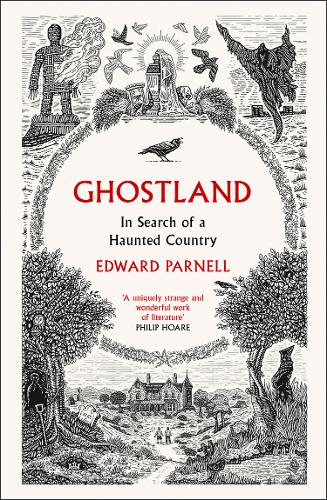|
If you spend any time in the lonely places of the British countryside – the deserted beaches, the dense forests, the Fens, the hills and mountains, the still ponds and lakes, the ruins half-swallowed by time – then you’ll be familiar with the occasional fleeting sense of there being something just out of sight, just out of hearing, a sense of watchfulness, of secrets and trauma long-hidden. It is these wild places, and the effect they have on us, that Edward Parnell explores in his outstanding book Ghostland – In search of a Haunted Country. In the best way, Ghostland is a difficult work to categorize. It is a book of haunted landscapes and haunted lives, a book filled with folklore, natural history, psychogeography and cinematic and literary references, all underpinned by the author’s deeply moving personal story. Whether exploring the crumbling cliffs and lonely beaches of Suffolk, or the sprawling Glasgow Necropolis, or the rugged coast and Neolithic moorlands of West Cornwall, and many locations in between, Parnell invokes a powerful sense of place and the stories and ghosts that surround and infuse them. Ghostland shines a light on some of Britain’s finest writers of horror and the uncanny, such as M.R. James, William Hope Hodgson, Arthur Machen and Alan Garner, showing how their obsessions and fears, and connections to their landscape, shaped their creations, often in unsettling ways. Although some of the authors mentioned in the book I am familiar with, there are others whose work I didn’t know, so one of the joys of Ghostland is discovering a list of novels and short stories I now can’t wait to read.
As well as ghostly literary tales, on-screen horrors are explored too, and not just folklore-inflected cinema and television such as The Wicker Man, The Children of the Stones and Jonathan Miller’s peerless M.R. James adaptation Whistle and I’ll Come To You (still an intense, disturbing experience), but also the dark strain of British public information films, which are vividly remembered, most likely in our personal and collective nightmares, by the generation exposed to them. For example, Lonely Water, a nightmarish warning of the perils of swimming in dangerous places (narrated with spine-tingling relish by Donald Pleasance), and Apaches, a terrifying short film I remember being shown at primary school – if the aim of Apaches had been to convince children growing up in rural Britain in the 1970s and 1980s that the countryside was filled with hidden and gruesome threats, then, from my perspective at least, it succeeded… I think anyone reading this book will find some moments of connection and resonance, whether in Parnell’s deep love and reverence for the natural world, his fascination with stories of the uncanny or in his sensitive but unflinching description of his own personal tragedies. For me, Ghostland demonstrates how our cherished places and stories – in any form – can help us manage and make sense of our real-life struggles. The best ghost stories don’t just frighten or excite us, they help to remind us to acknowledge painful memories – our own ghosts of the past – to help us move forward, to help us keep going, even when stricken with loss and grief. From the first page of Ghostland to the last, I fell under its haunted spell; I have no doubt it is a book I will revisit and reread, and I am sure every time I open it, I will find new treasures – and new horrors – buried within its pages.
1 Comment
|
Archives
October 2023
Categories
All
|

 RSS Feed
RSS Feed